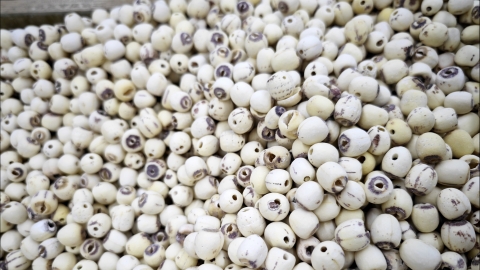What are the functions, effects, and contraindications of lotus seed, lily, and white fungus soup?
Generally speaking, the lotus seed, lily and tremella soup usually has functions and benefits such as moistening the lungs and relieving cough, nourishing the heart and calming the mind, strengthening the spleen and nourishing the stomach, beautifying the complexion, and enhancing immunity. The contraindications generally include avoiding use for individuals with wind-cold cough, cautious consumption for those with deficiency-cold of the spleen and stomach, avoiding use for those with excessive phlegm-dampness, cautious consumption for diabetic patients, and avoiding excessive consumption. Detailed analysis is as follows:

I. Functions and Benefits
1. Moistening the Lungs and Relieving Cough: In lotus seed, lily and tremella soup, lily can moisten the lungs and relieve dryness, while tremella nourishes lung yin. Combined consumption can alleviate symptoms such as dry cough with little phlegm and dry throat caused by lung dryness, making it suitable for drinking in autumn or dry climates.
2. Nourishing the Heart and Calming the Mind: Lotus seeds can nourish the heart and calm the mind, while lily soothes the heart and stabilizes the will. Combined with tremella, they can improve conditions such as restlessness, insomnia with vivid dreams, and emotional irritability, helping to soothe emotions and improve sleep quality.
3. Strengthening the Spleen and Nourishing the Stomach: Lotus seeds can strengthen and nourish the spleen and stomach, and tremella has a soft texture that is easy to digest. The soup is overall mild in nature and can nourish the spleen and stomach, enhance their digestive functions, and is suitable for people with weak spleen and stomach function to consume in moderation.
4. Beautifying the Complexion: Tremella contains natural plant gelatin, and both lily and lotus seeds are rich in various nutrients. When combined, they can provide nutrition to the skin, help improve skin condition, and keep the skin moisturized and radiant.
5. Enhancing Immunity: The soup contains nutrients such as protein, vitamins, and minerals, which can replenish the body's nutritional needs, promote metabolism, and help enhance the body's resistance.
II. Contraindications
1. Avoid for Individuals with Wind-Cold Cough: The lily and tremella in the soup tend to be cooling and moistening. Consuming them may exacerbate internal coldness in individuals with wind-cold cough, leading to worsened cough symptoms and being unfavorable for recovery.
2. Cautious Consumption for Those with Deficiency-Cold of the Spleen and Stomach: The cooling and moistening nature may irritate the spleen and stomach. Those with deficiency-cold of the spleen and stomach may experience discomfort such as abdominal pain and diarrhea after consumption and should consume cautiously or reduce the amount.
3. Avoid for Individuals with Excessive Phlegm-Dampness: The soup is relatively rich and greasy. Consumption by individuals with excessive phlegm-dampness may worsen internal phlegm-dampness, leading to increased symptoms such as body heaviness and thick, greasy tongue coating, affecting the body's qi circulation.
4. Diabetic Patients Should Consume Cautiously: Tremella and lotus seeds contain certain amounts of sugar, and the soup is usually sweetened with rock sugar. Consumption by diabetic patients may lead to elevated blood sugar levels, which is unfavorable for blood sugar control.
5. Avoid Excessive Consumption: Excessive consumption may increase the gastrointestinal digestive burden, causing symptoms such as abdominal distension and loss of appetite. It is recommended to consume in moderation to maintain physical comfort.
When consuming lotus seed, lily and tremella soup, one should determine its suitability based on individual constitution, and those falling under the contraindications should avoid or reduce consumption.






